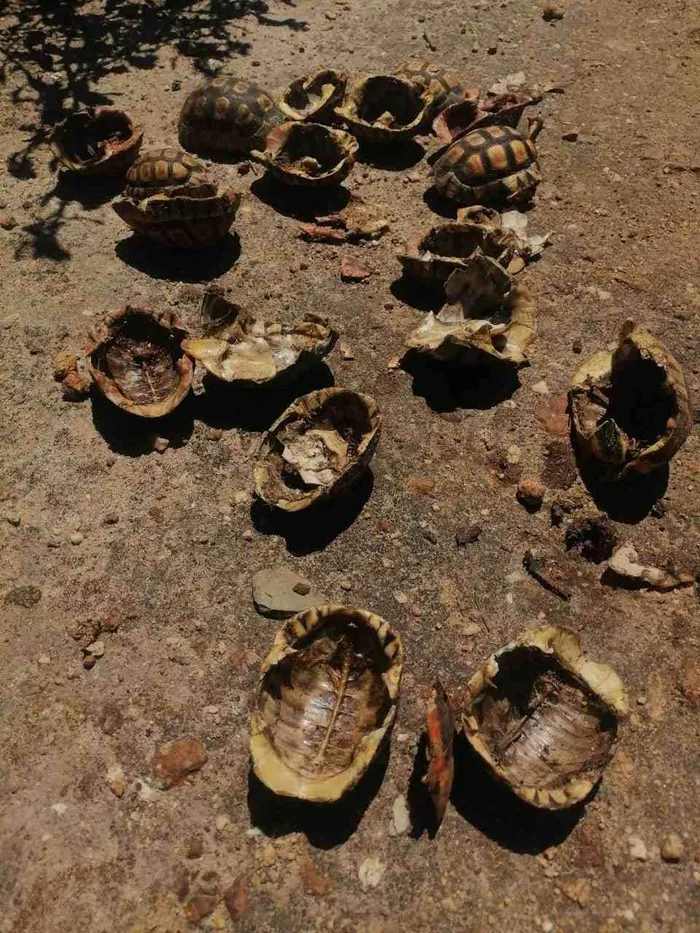
The shattered remains of 19 Angulate tortoises found at the Table Bay Nature Reserve.
Image: Supplied
Nineteen slaughtered tortoises were discovered at the Table Bay Nature Reserve on Saturday, alarming conservationists and raising concerns about the potential encroachment of organised wildlife trade in Cape Town.
The tortoises were found along a footpath near the reserve’s Environmental Education Centre, with only their empty shells remaining. Officials from the City of Cape Town suspect the animals were “shucked and harvested” for meat or traditional purposes.
Police are currently searching for two men who entered the reserve earlier that day under the guise of fishing.
“This is a serious case of animal cruelty and a violation of environmental protection laws,” said the City’s Deputy Mayor and Mayoral Committee Member for Spatial Planning and Environment, Eddie Andrews. “These beautiful creatures were brutally killed, their shells broken open and discarded.”
Photographs and video footage of the suspects’ vehicle have been handed to police, CapeNature, and the SPCA for investigation.
While the killings have horrified Capetonians, wildlife experts say they are not an isolated incident.
“Tortoises form part of the larger illegal reptile trade and are commonly poached,” said CapeNature spokesperson Luke Folb. “The markets for South African reptiles include local as well as Asian, European, and North American buyers.”
Folb said tortoises are targeted for multiple reasons — the pet trade being the most common, followed by traditional medicine and, increasingly, bushmeat. “The bushmeat trade is a fairly new tendency,” he added.
CapeNature, together with SAPS’s Stock Theft and Endangered Species Unit, is investigating syndicates involved in wildlife smuggling and runs awareness programmes in vulnerable communities.
The Cape of Good Hope SPCA confirmed it was notified by the City on 4 November and is assisting with the investigation.
“This deeply concerning case reflects a wider issue of cruelty and exploitation of wildlife in the Western Cape,” said SPCA spokesperson Belinda Abraham. “These crimes often go unreported because they happen in remote areas with few witnesses.”
Abraham said the SPCA’s Wildlife Department is working closely with conservation services and has offered a R5,000 reward for information leading to a conviction.
“When tortoises are found alive, we assess and rehabilitate them before releasing them into protected areas,” she said. “When remains are found, they form part of the evidence to support criminal prosecution.”
While the City and conservation agencies have confirmed that a police case was opened, SAPS spokesperson Sergeant Wesley Twigg said that “Table Bay Harbour police don’t have record of the incident mentioned.”
It remains unclear which station is handling the case.
Experts say the incident highlights the need for tighter monitoring of urban nature reserves and for the public to report suspicious behaviour immediately.
Reserve staff conduct regular patrols, but officials warn that poachers often exploit gaps in surveillance. “We urge visitors to report any suspicious activity or behaviour,” said Andrews.
The SPCA echoed that call, urging residents to be the “eyes and ears” of wildlife protection efforts.
Anyone with information can contact the Cape of Good Hope SPCA at (021) 700 4158 or inspectorate@spca-ct.co.za, or report wildlife crimes to SAPS and CapeNature.
Cape Argus